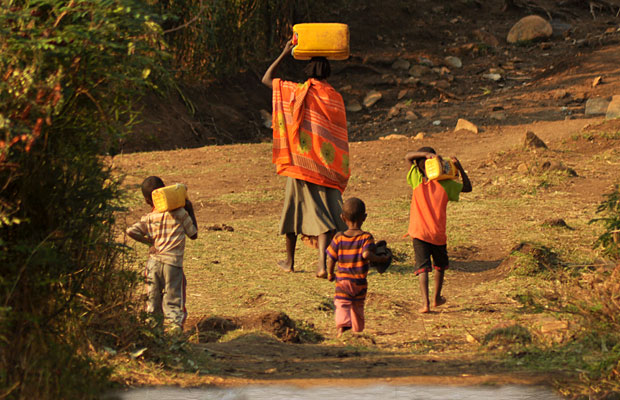
“Thank you for the clean water!”
Picture this: a steady stream of women, laboriously approaching a foul-smelling pool of water, each carrying an empty 20-liter bucket on her head. Taking turns, they plunge their containers into the mire—filling them to capacity before hauling 44 pounds of contaminated water home to their families for drinking, washing and cooking. And then they turn around to do it again.
Why? Because these women live in rural, impoverished Nigeria, where clean water is nearly impossible to find. Throughout the country, physical and economic water scarcity means that their only choice is to risk illnesses such as cholera, typhoid, dysentery and more, in order to provide for their families’ daily needs.
“It’s a situation our missionaries witness throughout sub-Saharan Africa and in developing countries around the world,” says Father Mark Hyde, director of Salesian Missions. “Every person requires water to survive but unfortunately, access to clean water depends on where you live. Water is a basic human right, but it’s certainly far from being universally accessible.”
Collecting water is repetitive, backbreaking work. According to the World Health Organization, 20 liters is only sufficient to meet one person’s daily food and personal hygiene requirements. So, these women—often accompanied by their children—collectively spend hundreds of hours doing it every single day. Or, at least, they did.
Now, picture this: exuberant children, crowded around a steady stream of sparkling clean water pouring out of taps located in the center of their village. One by one, each cups their hands underneath and takes a long, refreshing drink while their mothers watch and smile.
This is now a reality for mothers and their families in 10 poor communities in Nigeria where Salesian missionaries operate educational and social service programs. Funded by Salesian Missions through our Clean Water Initiative, the project involved drilling wells, constructing water tanks and installing plumbing and electricity needed to operate it. Guided by project managers Fr. Anthony Oche and Fr. Max Okoro—with assistance from Salesian missionaries and community members at each site—contractors completed all work within one year.
In total, an estimated 169,000 people no longer worry where their water will come from—or whether it will make them sick when they drink it. Women no longer suffer the physical effects of hauling such heavy loads and can devote more time toward raising their children and contributing to their families’ income. In a short video documenting the project, those exuberant children shout in unison, “Thank you for the water!”
“Each community will manage their own water resources, which requires skilled workers,” concludes Fr. Mark. “In addition to the improved health and hygiene they are now enjoying, young people will soon have the opportunity to train for, and secure, jobs that didn’t exist before.”
Our mission brings clean water to those most in need around the globe. What’s your mission?
Learn more about our work in Nigeria.

